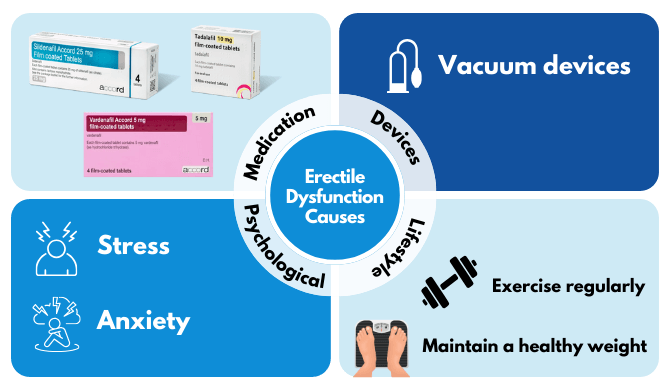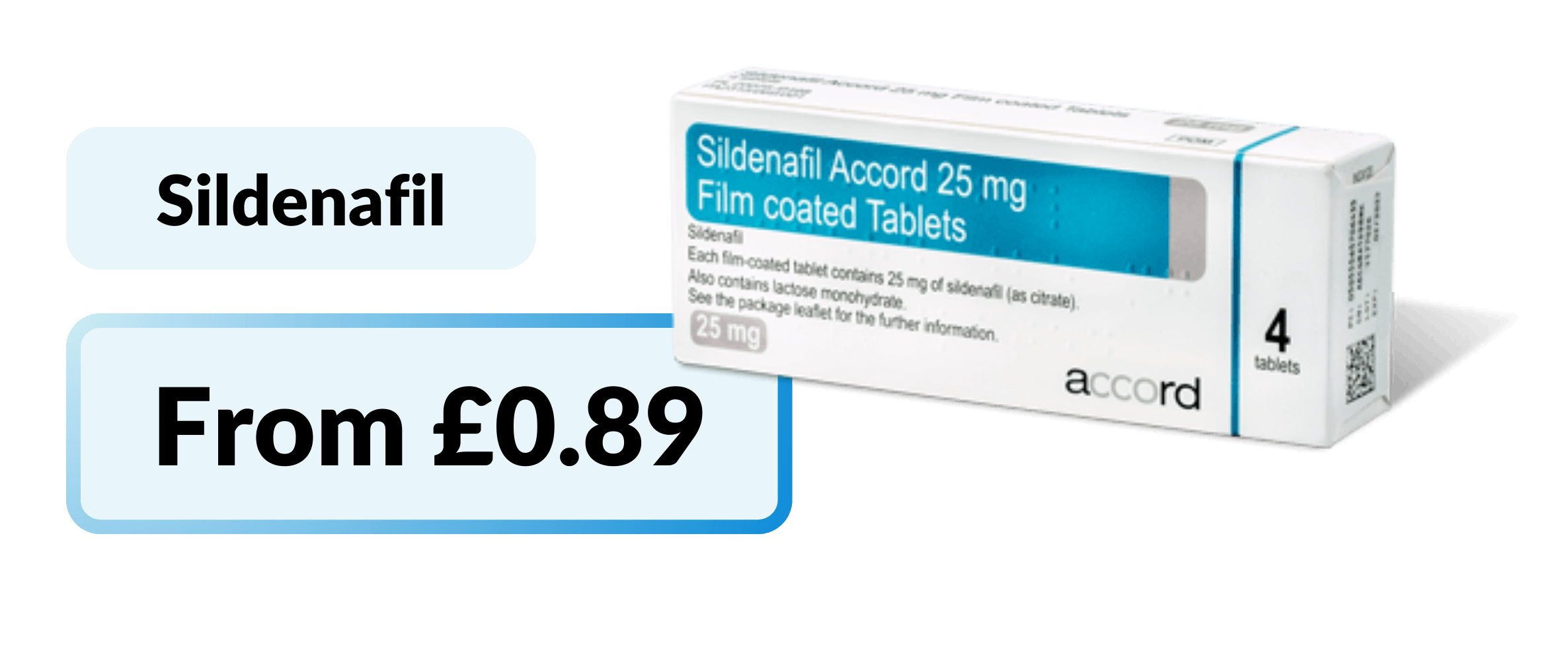Does Erectile Dysfunction Last Forever?
Table of Contents
Erectile dysfunction is a common trouble among men worldwide and is often seen as a condition down to the ageing. Recent studies highlighted a rising trend of ED among men under the age of 40. Leading to our commonly asked question, “Does erectile dysfunction last forever?”
In this blog, we investigate the complexities of erectile dysfunction, its causes, prevalence, and treatments. From lifestyle changes to medical therapies, we explore the different approaches to addressing ED.
What is erectile dysfunction?
Erectile dysfunction, also known as impotence, is the inability to get or maintain an erection firm enough for sex. It’s a common condition, particularly among men over 40, but it can affect men of any age. ED can arise from physical or psychological factors or a combination of both. While the occasional problem with erections is normal, continuous problems may indicate an underlying health issue that requires attention. Treatment options range from lifestyle changes to medication, depending on the underlying cause and individual circumstances.
ED Stats:
- 50-55% of British men aged 40-70 experience some degree of ED – source
- The Primary cause of ED is mainly caused by organic factors (neurogenic, vascular, diabetic, ), psychological factors (performance anxiety, stress, and mental disorders), iatrogenic factors (caused by surgical injury), and increasing age (ageing). –
- The average length of sex is 5.4 minutes in the UK – source

What causes erectile dysfunction?
Erectile dysfunction (ED) can have various causes, including:
Physical factors:
- Diabetes
- High blood pressure
- High cholesterol
- Heart disease
- Obesity
Psychological factors:
- Stress
- Anxiety
- Depression
- Relationship issues
- Performance anxiety
Lifestyle factors:
- Sedentary lifestyle
- Poor diet
- Lack of exercise
- Excessive alcohol consumption
- Illicit drug use
Does erectile dysfunction last forever?
Erectile dysfunction (ED) does not necessarily last forever. Whether ED persists depends on many factors, including its underlying cause, treatment options, lifestyle changes, and overall health.
In many cases, ED can be temporary and may get better with lifestyle modifications, such as embracing a healthier diet, regular exercise, reducing stress, and avoiding smoking and excessive alcohol consumption. Addressing underlying medical conditions contributing to ED, such as diabetes or hypertension, can help relieve symptoms.
Various treatment options are available for ED, including oral medications, such as sildenafil (Viagra), tadalafil (Cialis), vardenafil (Levitra), and avanafil (Spedra), which increase blood flow to the penis, facilitating erections. Other treatment modalities include:
- Vacuum erection devices.
- Penile injections.
- Testosterone replacement therapy.
- Counselling or treatment for psychological factors contributing to ED.

How long does erectile dysfunction last after steroids?
The duration of erectile dysfunction (ED) after steroid use can vary widely depending on several factors, including the type and dosage of steroids used, individual physiology, and the duration of steroid use.
Some men may experience temporary ED during or shortly after steroid use due to hormonal imbalances caused by the drugs. In these cases, erectile function may return to normal once steroid use is discontinued and hormone levels stabilize. However, in some instances, steroid-induced ED may persist for a more extended period, especially if there are underlying health issues or if steroid use has caused lasting damage to blood vessels or nerve function. – source.
How long does erectile dysfunction last after prostate surgery?
The duration of erectile dysfunction (ED) after prostate surgery can vary significantly depending on several factors, including the type of surgery performed, the individual’s overall health, and any pre-existing conditions that may affect erectile function.
In many cases, erectile function may gradually improve over time following prostate surgery, mainly if nerve-sparing techniques were used during the procedure. However, it’s not uncommon for men to experience temporary or even permanent ED after surgery, primarily if the nerves responsible for erections were damaged during the operation.
For some individuals, erectile function may return within a few months to a year after surgery as However, in other cases, ED may persist long-term, especially if there were pre-existing issues with erectile function or if additional treatments such as
How to treat erectile dysfunction permanently
Treating erectile dysfunction (ED) permanently may not always be possible, as it depends on the underlying cause. However, there are several strategies and treatments available to manage ED effectively and potentially improve erectile function in the long term. Here are some options:
Lifestyle changes:
- Maintain a healthy weight: Obesity and being overweight can contribute to ED. Losing excess weight through a balanced diet and regular exercise may improve erectile function.
- Exercise regularly: Physical activity improves blood flow, boosts cardiovascular health, and can enhance erectile function. Aim for at least 30 minutes of moderate exercise most days of the week.
- Eat a healthy diet: A diet rich in fruits, vegetables, whole grains, lean proteins, and healthy fats can support overall health, including sexual function.
- Limit alcohol intake: Excessive alcohol consumption can impair sexual function. Limit alcohol consumption to moderate levels.
- Quit smoking: Smoking damages blood vessels and can lead to ED. Quitting smoking can improve blood flow and erectile function over time.
Medications:
- Oral medications: Phosphodiesterase type 5 (PDE5) inhibitors such as sildenafil (Viagra), tadalafil (Cialis), and vardenafil (Levitra) are commonly prescribed medications for ED. These drugs enhance blood flow to the penis, facilitating erections. They are typically taken as needed before sexual activity.
- Hormone therapy: Testosterone replacement therapy may be beneficial for men with low testosterone levels contributing to ED.
- Other medications: In some cases, drugs such as alprostadil (Caverject, Edex) or testosterone may be administered via injection, suppository, or topical gel to improve erectile function.
Psychological counselling:
- Counseling or therapy may be helpful for men with ED related to stress, anxiety, depression, or relationship issues. Addressing underlying psychological factors can lead to improvements in sexual function.
Vacuum devices:
- Vacuum erection devices (VEDs) are non-invasive devices that create a vacuum around the penis, drawing blood into the penile tissues to induce an erection. These devices may be used alone or in combination with other treatments.
Erectile Dysfunction FAQs
Does erectile dysfunction go away by itself?
Erectile dysfunction (ED) may resolve on its own in some cases, mainly if it is caused by temporary . However, persistent, or recurring ED is that may require treatment.
While occasional episodes of ED may not be cause for concern, ongoing or chronic erectile difficulties should prompt a discussion with our pharmacist to determine the underlying cause and appropriate treatment options. Ignoring persistent ED could lead to worsening symptoms and potentially impact overall quality of life and relationships.
Is erectile dysfunction normal?
Yes, erectile dysfunction (ED) is relatively common, especially among men over the age of 40. It’s considered a normal part of ageing for many men. However, it’s important to differentiate between occasional episodes of ED, which can happen to most men from time to time, and persistent or recurrent ED, which may indicate an underlying health condition that requires attention.
Factors such as stress, fatigue, relationship issues, and lifestyle habits like smoking or excessive alcohol consumption can contribute to ED. In some cases, underlying medical conditions such as diabetes, high blood pressure, or hormonal imbalances may also play a role.
Is erectile dysfunction a normal part of ageing?
While it’s true that the prevalence of ED tends to increase with age, it is not an inevitable part of aging. Many older men continue to have satisfying sexual relationships. However, age-related conditions such as vascular disease and hormonal changes can contribute to the development of ED.
How is erectile dysfunction diagnosed?
Diagnosis of Erectile Dysfunction typically involves a thorough medical history, physical examination, and possibly additional tests such as blood tests, urine tests, and a psychological evaluation. These assessments help identify any underlying medical or psychological causes of ED.
Can young people suffer from ED?
Yes, young people can also have erectile dysfunction (ED), although it’s less common in younger age groups compared to older men. Studies have shown that a significant proportion of men under the age of 40 experience ED to some degree.
Various factors can contribute to ED in younger men, including psychological factors such as stress, anxiety, or performance pressure, as well as lifestyle factors like smoking, excessive alcohol consumption, or drug use. Additionally, underlying health conditions such as diabetes, heart disease, hormonal imbalances, or neurological disorders can also play a role.
Are oral medications for erectile dysfunction safe?
Oral medications for ED, such as sildenafil (Viagra), tadalafil (Cialis), and vardenafil (Levitra), are generally safe and effective when used as directed and under the supervision of a healthcare professional. However, they may interact with certain medications or medical conditions, so it’s essential to discuss any concerns with your doctor.
Can erectile dysfunction be cured?
The success of treatment for ED depends on various factors, including the underlying cause, overall health, and individual response to treatment. While some men may experience complete resolution of their ED with treatment, others may require ongoing management. With the right approach, many men can achieve significant improvement in their erectile function and regain sexual confidence.


